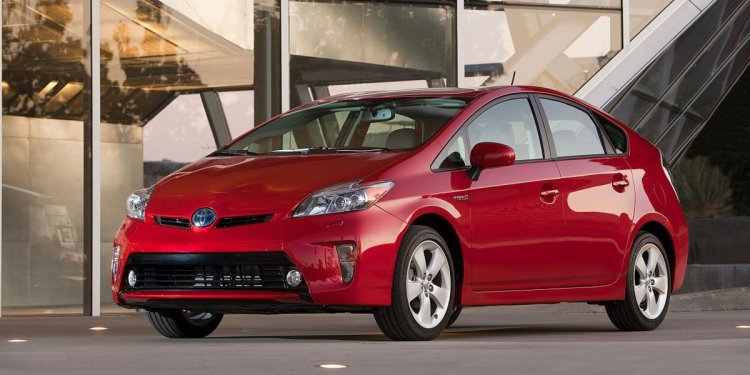Toyota was right about hybrid cars all along
Toyota's slow-and-steady approach to EVs and hybrids is going well, despite years of criticism.

Matt Cardy/Getty Images
- Once a laggard, Toyota is now well-positioned to meet a new EV market.
- Toyota's hybrid-heavy approach is actually going well.
- Even the company's competitors are coming around on hybrids.
Toyota, the originator of the hybrid car craze in the early 2000s, is poised to reclaim its crown as the king of green cars.
As demand for battery-electric vehicles cools and more shoppers look toward hybrids, the Prius-maker is among the most well-suited to meet the current moment in the transition to electric cars.
After years of being labeled an EV laggard among its peers in the industry, customers don't appear to care that Toyota has so far only released one pretty unpopular electric car in the US (you know, the one with the wheels that literally fell off).
The Japanese automaker actually tops the list of brands most considered by EV shoppers in a recent study — beating out Elon Musk's Tesla and Ford. It would appear Toyota's more hybrid-heavy approach to electric cars is alluring for the new breed of electric car shopper, more frugal and practical than the early adopters that came before them.
"Toyota has been talking more about this bridge between where we're at on the transition from internal combustion to fully electric," Jeremy Korst, president of GBK, a consulting firm that did the study, told Business Insider. "Other manufacturers — until as of late, of course — have made pretty strong positions on EVs only."
The latter position isn't resonating well with customers, Korst said.
Chairman Akio Toyoda has long been a skeptic of the industry's all-in attitude on battery-powered vehicles, preaching instead the importance of Toyota's "multipathway approach," in which the automaker is researching and developing a variety of alternatives to the internal-combustion engine.
Toyoda has pushed back on proclamations that EVs will one day become the dominant powertrain. Most recently, he predicted in January that "no matter how much progress BEVs make," these cars will still only eventually account for 30% of global market share, at most.
Detroit might owe Toyota an apology
Toyota's competition — particularly in Detroit — has plowed billions of dollars into new electric lineups and promised an all-electric future was just around the corner. This, paired with the success of Tesla and overall investor enthusiasm for EV technology, left Toyota looking like a laggard.
Despite years of criticism, it appears that Toyota might have had the right idea after all.
Hybrid sales rose much more quickly than EV sales last year, up 65% to more than 1.2 million, according to Cox Automotive. While Americans bought the same number of purely battery-powered EVs, that segment's growth was just 46% year-over-year, according to Cox.
Shoppers in the market for a hybrid are also much more likely to pony up more cash for these cars.
Companies like Ford and GM, which were relying on high-priced, luxury EVs to carry them to profitability, are going back to the drawing board this year as the makeup of the EV market changes.
In a move that vindicated Toyota's commitment to hybrids, GM recently went back on its plans to skip hybrids in North America, with CEO Mary Barra telling investors that the company is bringing some hybrid options to the region this year.
Toyota has spent the last several years releasing more hybrids and plug-in hybrids, while refusing to give up on the nascent hydrogen fuel cell technology that many of its competitors have largely abandoned.
It appears this long game on EVs is working for customers right now.
What's Your Reaction?




















